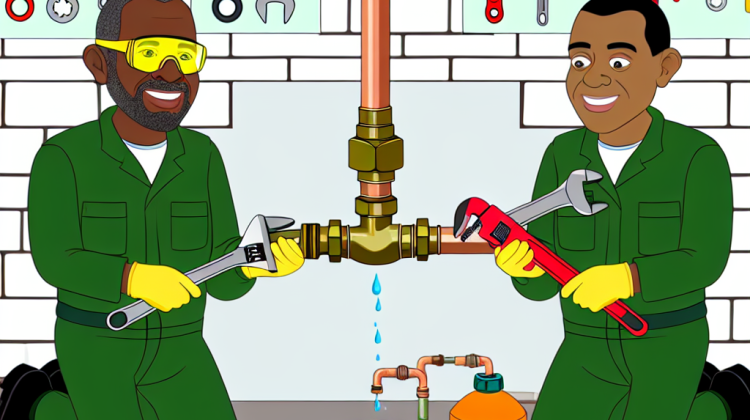
Did you know that corroded plumbing connections can lead to a whole lot of trouble? Yep, those pesky old pipes can turn your home into a mini water park if they start to leak! Corrosion happens when metal pipes get all rusty and wear down over time, usually from water and air messing around with them. Back in the day, plumbing systems used to be made of metal, which is super strong but can also rust like a bike left out in the rain. Nowadays, folks use materials like PVC and PEX, but if you’ve got older pipes, you might have to deal with some corroded connections.
Now, let’s talk about why this is super important right now! Many homes still have those old, rusty pipes lurking around. If you notice a drip or hear weird sounds from your plumbing, it could mean there’s trouble. Thankfully, you can loosen those corroded plumbing connections without turning your house into a construction zone. You won’t need a PhD in plumbing to do it—just some simple tools and a bit of patience!
One way to tackle this issue is by using heat. Sounds fancy, huh? But don’t worry, you won’t need a blowtorch! Instead, a heat gun or even a hairdryer can work wonders. The heat makes the metal expand a little, which can help break the corrosion’s grip. Just make sure to keep the heat moving so you don’t accidentally damage anything else. So, there you are, ready to take on that stubborn connection with a bit of warmth!
If heat doesn’t do the trick, here’s another trick up your sleeve—use some penetrating oil! This stuff is like magic for rusty connections. Just spray it on, wait a little while, and you’ll find it easier to turn the fittings. It seeps into the cracks, making it way less sticky! There’s a common saying that patience pays off, and in this case, it really does. Give it some time to work its charm.
Sometimes, a little muscle power helps too. Good ol’ tools like a pipe wrench or pliers can come in handy—just remember not to go overboard! You don’t want to crush the fittings but instead apply just enough pressure. It’s all about that sweet spot between too soft and too strong. And don’t forget to wear some gloves, because you never know what might be hiding on those pipes!
For those really tricky cases, try tap-tap-tapping with a hammer! Yup, it sounds silly, but gently tapping on the corroded connection can help break it loose. The vibrations do the trick, loosening up all the gunk that’s holding everything together. Just be careful—too much force can lead to your pipes turning into a bigger mess. It’s all in the finesse, my friend!
In the end, tackling corroded plumbing connections doesn’t have to be a nightmare. With the right tools and techniques, you can take control of your pipes and keep everything flowing smoothly. No need to call a plumber right away; just remember, a little heat, some oil, and a sprinkle of patience can go a long way!
How to Loosen Corroded Plumbing Connections
First off, if you’re facing a corroded plumbing connection, you’re not alone. Many folks find themselves in the same pickle. When metal pipes get old, they can develop rust and corrosion, making it tricky to unscrew or adjust them. But fear not; there are ways to loosen those stubborn connections without losing your cool!
Gather Your Tools
Before diving into the fix, gather the right tools. You’ll need:
- A wrench or adjustable pliers
- Penetrating oil (like WD-40)
- A wire brush
- A clean rag
- Safety goggles
Start with Safety
Don’t forget your safety goggles! They’re like little shields for your eyes against flying debris. Nobody wants to get hurt while tackling a project, right?
Apply Penetrating Oil
Once you’re geared up, it’s time to treat the corroded connection. Squirt some penetrating oil on the rusted area and let it sit for at least 15 minutes. This stuff works wonders, easing the tight grip of corrosion. It’s like giving your plumbing a much-needed relaxation session!
Scrub Off the Rust
Next, you’ll want to take your wire brush and gently scrub the rusty areas. This is like giving it a good bath! It helps remove any loose rust, making it easier to work with. Keep an eye on the mess you’re making; it might get a little messy!
Use the Wrench Wisely
Now comes the fun part: using your wrench. Clamp it onto the connection. Give it a little twist to see if it budges. If it feels stuck, don’t yank on it too hard; you might break something! Instead, try rocking the wrench side to side gently. This motion can help shake things loose.
Heat Things Up
If that connection’s still being stubborn, you might need to bring in some heat. Grab a heat gun or a hairdryer and see if you can warm up the metal. The heat helps expand the metal, loosening the corrosion. Just be careful not to overdo it and melt any nearby plastic!
Give It Another Try
After heating up the area, give that wrench another go. More often than not, the combination of heat and oil works like magic. You should feel it starting to loosen up. If it doesn’t budge, you might need to apply more oil and wait a while longer.
When to Get Help
If you’ve tried everything and it’s still stuck, don’t hesitate to call in a pro. Sometimes, a plumber’s expertise can save the day faster than you can say “corroded connection.”
Remember, about 70% of home plumbing issues are related to corroded pipes, so you’re definitely not alone. With a little patience and the right approach, loosening your plumbing connections is within reach!
“`html
How to Loosen Corroded Plumbing Connections FAQ
What causes plumbing connections to corrode?
Well, rust and mineral buildup can make connections super tight over time. Things like water quality, age of pipes, and temperature changes all play a part!
Can I use heat to loosen corroded connections?
Yep! Sometimes applying heat with a heat gun or a blow dryer can help. Just be careful not to overdo it, or you might damage the pipes!
What tools do I need to loosen a corroded connection?
- A wrench or pliers
- Penetrating oil, like WD-40
- A heat source
- Safety goggles to protect your eyes
How do I apply penetrating oil?
Just spray or apply a little of the oil on the corroded area. Let it soak in for about 10 to 15 minutes. It’ll help loosen things up!
Is it safe to use a hammer on the plumbing?
Usually, it’s best to avoid hitting pipes with a hammer. You don’t want to cause any leaks, do you? Instead, try gentle taps if you really need to.
What if the connection won’t budge at all?
If it’s refusing to move, take a break. Sometimes stepping away for a bit and coming back fresh can make a world of difference!
Can I call a plumber if I can’t fix it myself?
Absolutely! Plumbers are like superheroes for your pipes. If you’re stuck, don’t hesitate to call one. They’ll save the day!
Will loosening a corroded connection damage the pipe?
It’s possible. If you’re not gentle, the pipe could crack or break. Always go slow and steady, okay?
Should I replace corroded pipes?
If they’re really bad, it might be best to replace them. This can help prevent future problems, so it’s something to think about!
How can I prevent future corrosion?
- Keep an eye on water quality
- Insulate pipes
- Regularly check for leaks
“`
Conclusion
To loosen corroded plumbing connections, first, it’s super important to gather the right tools. You’ll need some adjustable wrenches, penetrating oil, and maybe even a cloth or rag. Give that corroded area a good spray with the oil, and let it sit for a bit. This helps break down the rust that’s holding things tight. After a few minutes, grab your wrench and turn it gently. Remember, it’s all about patience here! If it doesn’t budge, don’t force it; try moving it back and forth a little to free it up.
If the connection still won’t release, you might want to tap it lightly with a hammer. Just be careful not to break anything! Sometimes, a little encouragement does the trick. And if things get really tricky, heating the metal with a heat gun can help expand it, making it easier to loosen. Just be extra cautious if there’s plastic nearby. So, with the right tools and a little elbow grease, you can tackle those stubborn plumbing connections and keep everything flowing smoothly!
